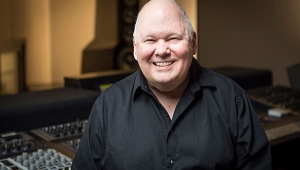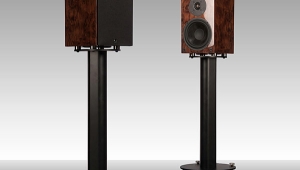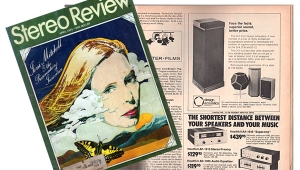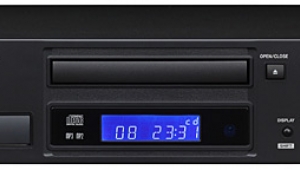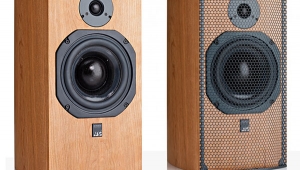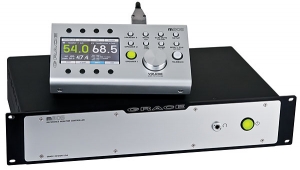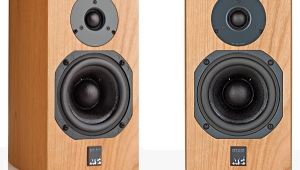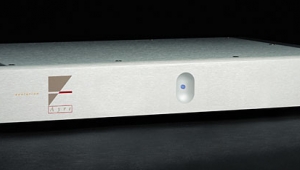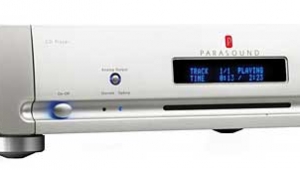| Columns Retired Columns & Blogs |
The Fifth Element #29
Imagine two people who have been audiophiles for 20 years. When they first met, Audiophile #1 had just decided that he would do his best to buy a system that he could keep for the indefinite future, without anxiety about upgrades. Let alone get off the "equipment upgrade" merry-go-round, he never wanted to get on it in the first place. Audiophile #1 also decided that having a truly great music system in his home was more important to him than buying a new car every three years. He found a dealer who sold systems based on value rather than on price. He ended up both exhilarated and intimidated, not only at the amount of money he had spent but at how good his stereo system sounded. He then stopped messing with it, sat back, and enjoyed the music.
Footnote 1: Nearly all audio equipment and nearly all cars are depreciating assets. The prudent goal is to have the depreciation curve more resemble a gentle glide than the trajectory of a dropped ring of car keys. Even Gullwing Mercedes (in the aggregate) haven't beaten the stock market, taking into account the cars' storage, insurance, restoration costs, and auction commissions. But owning a Gullwing rather than banking the cash can be justified, because the Gullwing is fun to own and even more fun to drive. Trivia bit: Miles Davis reportedly used his first Columbia Records royalty check, from 'Round About Midnight, to buy a Gullwing.—John Marks
Audiophile #2 shopped for bargains, starting with an odd assortment of closeouts and trade-ins. Every few months or once a year he would swap out the component he was the most disenchanted with at the time. He would go from one dealer to another, trying to play one against the other. He never found a dealer who took his needs seriously and who was willing to help him to put together a system that worked well in his listening room. Perhaps this was related to Audiophile #2's practice of greeting every new salesperson with the words "I always shop around and I never pay list price." Audiophile #2 lost money on each trade-in or private sale, but somehow he never was able to pull the trigger on something truly exceptional. And he was never really happy with his system.
In this thought experiment, the first audiophile could have bought Duntech Sovereign 2001s—20 years ago the mastering speaker of choice for industry legends such as Bob Ludwig—a Jeff Rowland Model 5 stereo amplifier and Coherence preamplifier, a Well Tempered Turntable, and a Meridian CD player. That system would have set him back about as much as a new midsized Mercedes sedan (albeit one with a vinyl interior).
And you know what? Someone who bought such a system back then and held on to it has spent nearly 20 years ahead of the game in at least three ways. First, his system has always sounded great. Even by comparison with today's best products, the old Jeff Rowland gear and big Duntechs are still very listenable, with dynamic and bass capability many modern systems can't match. Second, his blood pressure, or at least his anxiety level, has been lower because he's had a system that works as a system and in his room. He has not wasted any time or money in lateral trades that merely relocate a problem: "Squeeze it here, it bulges there." Finally, classic gear that was the top of the line back then has done a better job of holding its resale value than gear from also-ran or defunct companies. Audiophile #1's system still has significant trade-in or resale value.
I can't prove it, but my educated guess is that Audiophile #2, over the course of years, spent (net) nearly as much money on the 20 or more components he swapped around as Audiophile #1 did on the five components he bought and kept. This is analogous to the difference between buying a basic Mercedes sedan, maintaining it well, and driving it "forever" (say, 20 years or 300,000 miles), and buying a succession of "more affordable" cars every three or four years, getting hosed on every trade-in ("What do you mean, this car is worth $7395?! I bought it here just three years ago for $20,000!"), and always being "upside down": ie, owing more on the car loan than the car is worth at resale or trade-in.
I recognize that there are some people for whom messing around with equipment as such is the hobby, rather than primarily using the equipment to listen to music. But most of the people who ask me for equipment advice are music lovers first. Many of them seem to feel that delivering lasting value for money is something the audio industry rarely does a fantastic job of (footnote 1).
"We have met the enemy, and he is us"
It seems that some music lovers aren't getting as good value for their equipment-purchase money as they might. What might be the causes of this predicament? Here are my nominations:
Dealers who have lost the True Way or who never had it to begin with.
This is manifested in going for the short-term buck and feeding into (and off of) Audiophilia nervosa.
For example: if a customer walks into an audio showroom all jazzed up from reading a rave review of the HAL 9000 preamplifier, the pragmatic dealer will (financially) qualify the prospect, give enough of a demonstration to set the hook, end the demonstration while the prospect is still itching for more, and close the sale.
Whether that preamp is the best thing for that system, or whether an equivalent amount of money spent on other components would yield greater benefits, are not the pragmatic dealer's concerns. Caveat emptor, buddy. If the HAL 9000 doesn't sound as good in the customer's home as it did in the dealer's showroom, perhaps the dealer can then sell the customer some power cords or interconnect cables.
Remember, the dealer who set up Audiophile #1 with his "buy it once, buy it right, get off the merry-go-round" system did himself out of a big load of "upgrade" business over the intervening years. The only way for the "buy it once, buy it right" dealer to make his business plan work is to get referral business from satisfied customers, thereby always broadening his base. That's a much harder row to hoe than phoning your neurotic audiophile customers and telling them that what you sold them last year now sucks.
Audio dealers are always hearing the hissy sound of the serpent in the garden, urging them to call up their insecure customers with the news that the new, improved Amber Nematode power cord "just blows away" the now-obsolete version they bought three or six months ago. It takes moral courage to put your customers' interests before your own. Such courage should be recognized and rewarded with your business.
Customers who shop for "bargains" rather than for value: One could say that if there were no bad audio customers, there might not be any bad audio dealers. Getting a stereo system that sounds as if it's worth the money is more like hiring an interior decorator than buying a can of paint. And, just as is the case with an interior decorator, I think any audio dealer who proposes to sell you a full-range system costing as much as a new car, without at least offering to visit your house to evaluate your listening room, is a charlatan or a buffoon. Or both.
The dealer who does visit your home, gives you the benefit of his experience, and really delivers the musical goods deserves appreciation, loyalty, and fair payment. To hear some dealers talk, audiophiles give audio dealers a world of financial grief that they never would dream of giving to their auto mechanic, dry cleaner, or dentist. (Dry cleaning, by the way, is a gold mine. For most high-end dealers, selling two-channel audio is not.)
You may not believe it, but some manufacturers of audio equipment are so old-school that they price their products to be fairly priced at full list price. In other words, they do not build in phony markup to make people think that they're getting a discounted bargain when in reality they are just paying the target price.
Look at the discounting issue this way. If you walked past a musical-instruments store and saw in the window a guitar with a tag on it saying "List Price $1000, Our Regular Price $599, Today's Special Price $499," I doubt you would think that the guitar was worth $599, let alone $1000. I'd assume that that guitar cost the dealer no more than $250, and that $499 was his target price all along. If you offered the dealer $299 and it was a slow day, he might take it. So how is that a $1000 guitar?
In stark contrast, if you went to a workshop that made classical guitars by hand, they might tell you that they offer two models, one at $5000 and one at $12,000, no haggling, and that is that. Would you be unbearably surprised? I hope the parallels to mass-market vs high-end audio equipment manufacture and pricing are obvious.
Some audio products do have phony markup built into their prices, and some audio manufacturers give dealers disproportionate margin. But, in general, the higher you go in quality, the more the standard terms prevail, and the more difficult it is for a dealer both to give full service and to cut prices.
In my thought experiment above, Audiophile #1 bought value and Audiophile #2 shopped for price. Who came out ahead? In my opinion, the best way to lose track of true value and end up with a system that represents poor value is to obsess about price—and especially about discounts. Paying list price isn't foolish if you get your money's worth.
The tyranny of the new: I feel for audio companies that show the courage of their convictions by offering essentially unchanged products for several years running, in the belief that those products continue to meet real needs. The downside is, such manufacturers don't have much "new" to announce each year at the Consumer Electronics Show.
Newer isn't always better, but it usually gets more attention. If a product needs a revision within its first year or two of release, in my opinion it was not ready for prime time. I regard manufacturers whose product models change very frequently with some suspicion. If they can't decide what is good, how can I? And if something is good, why don't they keep making it? Either the manufacturer is getting on-the-job training at his customers' expense, or there may be some manipulation going on.
Magazine publishing cycles: A minor but nonetheless present factor. It is difficult, within the confines of any given issue of a magazine, to present a balanced assessment of the overall state of the art. This is a challenge even within an entire publishing year. To an extent, "Recommended Components" lists help. But worthwhile products get dropped from such lists all the time, simply because they have not been heard within a few years, and therefore it is difficult to benchmark them against more recent designs.
A fortunate few long-lived products, such as the Quad ESL-63 loudspeaker, have managed to achieve classic status. But to pick one example, the Gradient Revolution was, 10 years ago, a loudspeaker that regular readers of the US high-end audio press would know had gained a critical consensus as an excellent loudspeaker and excellent value for money. I am prepared to believe that it still is. (I probably should arrange an audition.) My point is that, just because a product may have fallen off the magazines' radar screens doesn't mean it can't be great, or that it might not be the best thing for you.
Footnote 1: Nearly all audio equipment and nearly all cars are depreciating assets. The prudent goal is to have the depreciation curve more resemble a gentle glide than the trajectory of a dropped ring of car keys. Even Gullwing Mercedes (in the aggregate) haven't beaten the stock market, taking into account the cars' storage, insurance, restoration costs, and auction commissions. But owning a Gullwing rather than banking the cash can be justified, because the Gullwing is fun to own and even more fun to drive. Trivia bit: Miles Davis reportedly used his first Columbia Records royalty check, from 'Round About Midnight, to buy a Gullwing.—John Marks
- Log in or register to post comments
